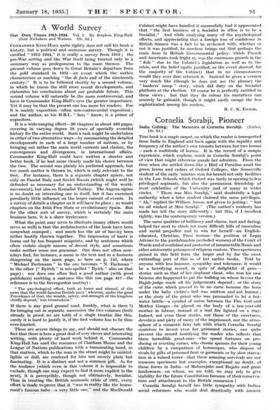A World Surve
Our Own Times 1913-1934. Vol. By Stephen King-Hall.
(Ivor Nicholson and Watson. 10s. ad.) - COMMANDER KING-HALL quite rightly does not call his book a history, but a political and economic suriley. Though it is entitled " 1913-1934," it is really a survey from 1919 ; the
pre-War setting and the War 'itself being treated only in a summary way as prolegomena to the main themes. The present volume goes down to Great Britain's departure from
the gold standard, in 1931—an event which the authnr characterizes as marking " the de facto end of the nineteenth century." It is to be followed shortly by a second volume, in which he- traces the' still more' recent developments, and elaborates his conclusions about our probable future. This
second volume will naturally be the more controversial, and have in Commander King-Hall's eyes the greater importance. Yet it may be that the present one has more for readers. For it is mainly exposition—often non-controversial exposition ; and the author, as his B.B.C. " fans " know, is a prince of expositors.
It is a wide-ranging effort-20 chapters in about 420 pages, covering in varying degree 18 years of specially eventful history fOr the entire world. Such a task might be undertaken in either of two alternative ways—by summarizing the detailed developments in each of a large number of nations, or by bringing out rather the main world currents and clashes, the convergences and divergences, in international affairs. Commander King-Hall could have written a shorter and better book, if he had more clearly made his choice between the two. The second was plainly his preferred approach, but too much matter is thrown in, which is only relevant to the first. For instance, there is a separate chapter apiece, not only on Fascist Italy and Soviet Russia (which might well be
defended as necessary for an understanding of the world- movement), but also on Kemalist Turkey. The Angora regime is no doubt an interesting one in itself, but it has exercised
peculiarly little influence on the larger current of events. In a survey of details a chapter on it will have its place ; as would chapters on the Irish Free State or revolutionary Spain. But for the other sort of survey, which is certainly the main business here, it is a sheer irrelevance.
What the point may serve to illustrate (many others would serve as well) is that the architectonics of the book have been somewhat scamped ; and much has the air of having been rather hastily thrown together. The impression of haste is borne out by too frequent misprints, and by sentences which often violate simple canons of decent style, and sometimes make neither sense nor grammar. One does not often now- adays find, for instance, a name in the text and in a footnote disagreeing on the same page, as here on p. 145, where " Michael Farbmann " in the one becomes " N. Fachman " in the other (" Ilyitch " is mis-spelled " Ilyick " also on that page) ; nor does one often find a good author (with good publishers) emitting a sentence like this (on page 417—the reference is to the Invergordon mutiny) : '
" The psychological effect, both at home and abroad, of the news that the world-famous British navy ` whereon, under the good Providence of God, the wealth, safety, and•Htrength of •the kingdom chiefly depend,' was tremendous."
-If there is any good ground (and, frankly, what is there ?) for bringing out in separate succession the two volumes (both already in proof, we are told) of a single treatise like this, surely it is hard to justify it, if the first volume has to be thus over-hurried.
These are severe things to say, and should not obscure the fact that there is here a great deal of very clever and interesting
writing, with plenty of hard work behind it. Commander King-Hall has used the resources of Chatham House and the League of Nations publications with a transmuting hand, so that matters, which to the man in the street might be unintel- ligible or dull, are rendered for him not merely plain but fascinating. It is a distinct and not a common gift. As for the tendance (which even in this volume it is 'impossible to exclude, though one may expect to find it more explicit in the next), it is perceptibly, though not obtrusively, Socialist. Thus in treating the British economic crisis of 1931, every effort is made to prove that it "was in reality like the house- maid's famous baby—a very little one," and the MacDonald
Cabinet might have handled it successfully had it appreciated that " the first business of a Socialist in office is to be a Socialist." And while analysing many of the psychological effects, and appreciating that a foreign loss of confidence in British finance was a fact to be reckoned with, whether or not it was justified, he nowhere brings out that perhaps the main item in British Governmental policy, which French and Americans took fright at, was the enormous growth in the " dole " due to the Cabinet's legislation as well as to the crisis, and the belief (quite justified, as the event showed, for the majority of the Cabinet) that in no circumstances would they ever dare retrench it. Instead he gives a version very much like (though he does not use the phrase) the " bankers' ramp "• story, which did duty on the Socialist platform at the election. Of course he is perfectly entitled to these views ; but that they do colour his narratives can scarcely be gainsaid, though it might easily escape the less sophisticated among his readers.
R. C. K. ENSOR.






































 Previous page
Previous page